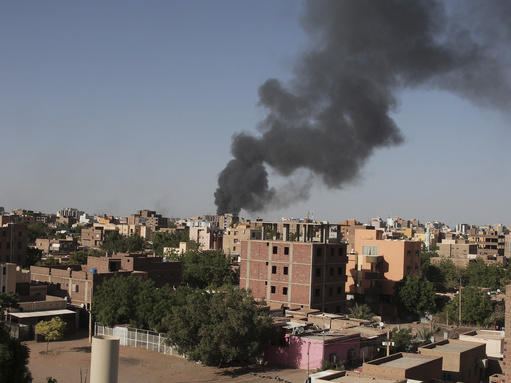Section Branding
Header Content
Khartoum's hospital system has collapsed after cease-fire fails
Primary Content
Updated April 20, 2023 at 10:40 AM ET
A dire human rights crisis is sweeping across Sudan's capital Khartoum, with few facilities or personnel to care for the hurt and wounded.
The secretary-general of the Sudanese American Physicians Association, Mohamed Eisa – also a gastroenterologist at Allegheny Health Network Medicine Institute in Pittsburgh – spoke to Morning Edition from Khartoum. Since the latest unsuccessful effort to impose a 24-hour ceasefire, he said, doctors and other medical personnel have been unable to get access to the wounded.
"We continue our ask and appeal for an immediate secure and safe passage to the health care facilities," Eisa tells NPR's A Martinez, referring to both the wounded and healthcare personnel.
Doctors are short on provisions from gauze and sutures to surgical supplies. "We are in dire need for blood and the bags that are used for blood transfusion," Eisa says. "Everything that we can get our hands on - it's definitely in a critical need right now."
Thirty-nine of Khartoum's 59 hospitals have been shut down by artillery fire and aerial bombing since a power struggle between rival military forces first erupted, according to the Sudanese American Physicians Association. Most of the remaining medical facilities have been battered by gunfire or overwhelmed by casualties.
After repeatedly hearing gunfire during what was supposed to be a 24-hour truce, Eisa and other physicians came up with a plan B to bring healthcare to Khartoum. They are transforming neighborhood primary care facilities into trauma centers. "It's easy for the medical personnel to access them because the medical personnel are actually living in the same neighborhood," he says.
The fighting between the forces of Army chief Abdel Fattah al-Burhan and the leader of the paramilitary Rapid Support Forces (RSF), Mohamed Hamdan Dagalo – also known as Hemedti – has forced thousands to flee. It's also imperiled a transition to democracy that began with a popular uprising.
The two generals, former allies, helped oust the regime of Omar Bashir in 2019. But then the urban warfare began Saturday — shattering a power-sharing plan for a military ruling council that would have led to civilian oversight.
Eisa says the war is affecting "only the innocents."
The interview has been lightly edited for length and clarity.
Interview highlights
On the efforts to impose a cease-fire to give doctors access to the wounded
Unfortunately, the clashes between the Sudanese armed forces (SAF) and the Rapid Support Forces (RSF) continue on the streets of Khartoum despite the agreed upon 24-hour cease-fire that was started yesterday at 6 o'clock in the evening. We continue to hear the sounds of heavy machinery and air fighters strikes during the early morning of today as well and just about half an hour ago. So the situation continues to be dire and continue to be guarded, unfortunately.
On the need for medical supplies
We need everything starting from just simple, normal saline, simple gauze, simple sutures all the way to the supplies that are used in the operating room for lobotomy, for extraction of gun wounds, chest tubes for those who sustain chest traumas, all kinds of supplies. We are in dire need for blood and the bags that are used for blood transfusion because those are in shortage as well. So everything that we can get our hands on, it's definitely in a critical need right now.
On a plan to turn neighborhood facilities into trauma centers
The primary health care centers here are historically based within the neighborhoods. So they are much safer. They are away from the main streets. And it's easy for the medical personnel to access them because most of the time, the medical personnel working in those primary health care centers are actually living in the same neighborhood. That's how it's been historically in Sudan. So this idea is now taking a lot of attention so that we can establish these as trauma centers to be equipped with maybe simple operating rooms that patients and the injured can get to easily. So that would be our plan B if the ceasefire has not really been responded to.
On what civilians in Sudan are saying about the fighting
This is a war that only the innocents and the people of Sudan are the ones that are affected from it. They all appeal for an immediate cease-fire. They all appeal for an immediate attention to the medical part of this. As they can see themselves, there is a human rights crisis happening day by day in Sudan, unfortunately.
Copyright 2023 NPR. To see more, visit https://www.npr.org.

